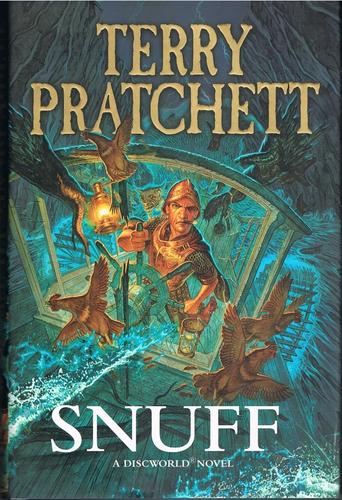kyonshi reviewed Snuff by Terry Pratchett (A Discworld Novel)
Review of 'Snuff' on 'Goodreads'
4 stars
There is a certain anger to Pratchett's writing that normally is hidden behind the humor of his stories. Snuff is the first book in his Discworld series that made my innards churn at the description of the goblins' plight (which are, of course, heavily inspired by real accounts of slavery and racism through the ages).
The book is technically a send-up on the cozy mystery genre. Commander Vimes goes on a (his first) holiday in the country estate that technically belongs to him, encounters all the "charming" follies of the aristocracy and peasant population of the place, and then is thrown into an investigation into murder and slavery in this oh-so-pleasant little community.
At the same time the watchmen back home also stumble over a terribly mystery connected with goblins.
Well, yes, I think the main problem of this book is, as with other of his later works, that it was dictated by an author who was slowly losing his mental capabilities. It still works for the largest part, but only just. There is no reason for the rather minor plot of Sgt. Colon being possessed, and as such it serves only to drop some more worldbuilding about the heretofore unknown culture of goblins on Discworld, and as a distraction of the main plot. Like it was a part of the formula that just needed to be there.
That said, the main part of the book is still excellent, and easily would be up there with the best of his Vimes stories. It has some nice deconstructions of the usual cozy mystery setting, it has the usual assortment of weird side characters, and it gently furthers the metaplot of the series, slowly pushing the setting further into the steampunk fantasy it was heading to (by introducing an actual non-urban background that was implied but never detailed before), and in typical Pratchett manner, it also takes a one-off joke from his previous book (the goblins mentioned in Unseen Academicals of which Mr. Nitt turned out not to be one) to deconstruct and reconstruct the hell out of it. In fact I think this is one of the most profound treatments of the "always chaotic evil" trope in fantasy fiction I have ever read. I think it is a pity he decided to tackle these issues only so late in his writing career, and the whole genre would have been better off if he had been able to do this to the fullest of his abilities.

